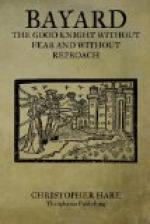The Duchess Blanche was never weary of talking with the Good Knight, who had always been so great a favourite of hers. But Bayard could not sleep all that night, for his mind was full of plans for carrying out the request of his lady. When the morning came he sent a trumpeter round to all the towns of the neighbourhood where there were garrisons, to make known to the gentlemen that if they would make their way within four days, on the next Sunday, to the town of Carignano, in the costume of men-at-arms, he would give a prize, which was the cuff of his lady, from whence hung a ruby of the value of a hundred ducats, to him who should be victorious in three encounters with the lance, without a barrier, and twelve turns with the sword.
On the appointed day, about an hour after noon, the Good Knight was at his place in the ranks, armed at all points, with three or four of his companions, but only those were with him who were prepared to take part in the coming contest. Bayard began first, and against him came the lord of Rovastre, a gallant gentleman who bore the ensign of the Duke Philibert of Savoy. He was a very hardy and skilful knight, who gave a fine thrust with his lance to begin with, but the Good Knight gave him such a blow on the broad band, which protected his right arm, that he disarmed him, and caused his lance to fly in five or six pieces. The lord of Rovastre regained his band and tilted with the second lance, with which he did his duty thoroughly ... but the Good Knight struck him on the visor, and carried off his plume of feathers (panache) and made him tremble, although he kept his seat on horseback. At the third lance the lord of Rovastre missed his aim, and Bayard broke his lance, which went to pieces.
After them came Mondragon and the lord of Chevron, who did their tilting so well that everybody applauded. Then came two others, and so on until all the company were satisfied.
The lances being broken it was now time for the contest with swords; but the Good Knight had only struck two blows when he broke his own, and sent that of his opponent flying out of his hand. The gracious Duchess requested the lord of Frussasco to invite all the gentlemen who had taken part in the tournament to supper. After supper the hautboys sounded, and the minstrels began to tune up in the gallery, but before the dancing began, it was decided to award the prize to him who had gained it. The lords of Grammont and Frussasco were the judges, and they asked all the company—gentlemen, ladies, and the combatants themselves—and they were all of opinion that the Good Knight himself, by right of arms, had gained the prize. But when they presented it to him he said that he did not deserve it, but that if he had done anything well, Madame de Frussasco was the cause, as she had lent him her sleeve, and that it was her place to give the prize as she chose.
The lady, who was well versed in the laws of honour and chivalry, humbly thanked the Good Knight for the honour which he had done her, and said: “As M. de Bayard has shown me this courtesy I will keep the sleeve all my life for love of him, while as for the ruby, I advise that it should be given to M. de Mondragon, for he is considered to have done the next best.”




